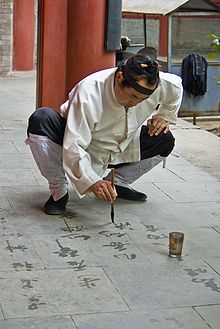- Daoshi
-
Daoshi (道士) refers to a priest in Taoism. According to legend, these Taoist recluses would practice alchemy and austerity in the mountains, with the aim of becoming xian, or immortal beings. The activities of the daoshi tend to be informed by materials which may be found in the Daozang, or Daoist canon; however, daoshi generally choose, or inherit, specific texts which have been passed down for generations from teacher to student, rather than consulting published versions of these works. Daoshi practices can include various ceremonies, including fortune telling.
See also
Categories:- Taoism
- Religion stubs
- Occupation stubs
Wikimedia Foundation. 2010.


